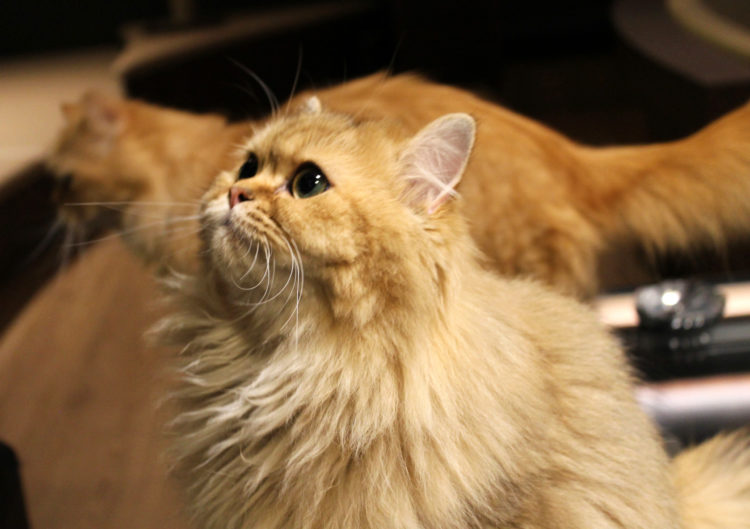On a rainy day in Japan’s Southern Wakayama Prefecture, more than 3,000 mourners shuffled through a small Shinto shrine to pay their respects to Tama, the beloved, departed stationmaster at Kishi train station.
Flowers were piled high next to images of Tama from happier times. A Shinto priest led a hymn as train riders, railroad personnel and Tama’s long-time admirers bowed their heads solemnly. Tama was a cat.
Land of the Rising Cat
In any other country, such an outpouring of grief at a feline funeral would seem unusual It even seem a bit crazy, but this is Japan, where loving cats is a national pastime.
Cat-obsession isn’t anything new for the island nation of 127 million people. As the Japanese love for all things feline is exported throughout the world, thanks mostly to internet culture, many are discovering just how deep Japan’s love for kitties runs. Such love was evident on a recent day in Tokyo when I visited Pucchi Marry, a cat café in Tokyo’s Roppongi district.
The café is situated on the second floor of a commercial building along one of the district’s busiest streets. Photos of adorable kitties beckon passersby and a “menu” advertises prices and services.
For 550 yen (a little more than $5), visitors can order a drink and spend half an hour with a cast of feisty furballs who love attention. During my visit, a long-haired Persian established herself as the catnip-lover-in-chief. She elbowed her way to the front of the line to lick a spoon, filled with the good stuff, held by another visitor.
Cafes: A way to relax with Japan’s cats
Anna Nagano, who owns the café and nine others throughout Japan, said she was inspired to get into the business after a friend brought her to one of the country’s first cat cafés. Nagano, who was suffering from depression at the time, said she felt her spirits lifted.
“It was my first experience at a cat café. I wasn’t an animal person before,” Nagano said, “but the experience changed my mind.”
“After that,” she said, “I fell in love with cats.”
In one corner of the café, a Scottish Fold lounged on a cat condo next to a playful tabby, while a Bengal mix climbed to the highest piece of real estate – a large shelf painted with the café’s logo – and supervised his kingdom.
Japan is a country where many people work long hours and live in cramped apartments. Keeping a pet isn’t always practical and cat cafés, Nagano said, are the perfect prescription for de-stressing. A cat café lets people pet and cuddle with fluffy friends without worrying about being an absentee owner.
From history to modern times
Cats have a long history in Japan. They made their mark long before the country modernized and became the technology-driven, population-dense place it is today.
Japanese museums attest to that history: Cats appear frequently on fuedal ukiyo-e, woodblock prints and paintings from the Edo period. These prints are fixtures in Japanese folklore, and images of cats have become ubiquitous thanks to the popularity of maneki-neko, the instantly recognizable figurines of smiling, welcoming kitties in virtually every shop and restaurant.
There are even entire Buddhist-Shinto shrines dedicated to cats, where the Japanese pray for success in life and business.
In a way, Kishi Station’s Tama is a real-life maneki-neko. The famous Calico’s primary job as stationmaster was to greet passengers from a special platform, where she stood with her custom-sewn railway hat and medallion.
In lieu of wages she was paid in cat food and treats and a former ticket booth was converted to her “office,” complete with a litter box and a bed.
True to a maneki-neko, Tama is credited with saving the station. It was on the brink of closure in 2007 when one of the last station employees elevated Tama from street cat to stationmaster. This move prompted ridership to spike by 10 percent. The “Tama effect,” as it’s now called, is worth an estimated 1.1 billion yen, or about $10 million, to the local economy. (Tama’s successor, Nitama, now greets riders boarding the train at Kishi.)
Today, there is a gift shop with Tama-themed merchandise, and the trains running on the station’s line are painted with images of the beloved cat.
Cats get noticed
The image of a cute cat commands notice on the busy streets of Japanese cities, where prominent signage and advertisements compete for the attention of pedestrians and commuters.
That may be why no one batted an eye when Satoshi Shima, a businessman and former member of parliament, chose a cat as his “running mate” in a bid to return to public office. The snow white, heterochromatic kitty appeared next to Shima in campaign posters, mailers and on his official campaign vehicle. In some posters the cat is the central focus, with a smaller image of a smiling Shima beneath.
The message is simple: Who are you gonna vote for, the stiff in a suit, or the jovial guy with the cute cat by his side?
More city-dwellers, more cats
The Japanese can’t seem to get enough of cats on the internet, in advertisements and in cafés, and now they’re adopting them in record numbers. In 2016, for the first time in Japan’s history, the number of pet cats pulled even with dogs. Experts say those numbers are influenced by mass migration to cities – a trend reflected in every first-world country – as well as the special place cats occupy in Japanese culture.
At Kishi, Yontama (“Tama Four”) is now an assistant to Natama (“Tama Two”) in greeting passengers riding the revived rail line.
“Having her around the station makes everyone happy,” a train conductor told the BBC.
Just like their counterparts across the globe, cats have a natural way of making their human caretakers feel like servants. But at Kish station, Natama really does have staff.
“I sometimes forget,” the conductor said, “that she is my boss.”










